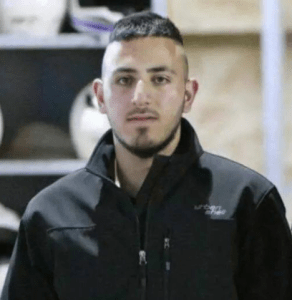
July 21, 2017: Mohammad Hasan Abu Ghannam, 20, was killed by Israeli soldiers during protests that took place after the army invaded at-Tour neighborhood, in East Jerusalem.
Eyewitnesses said that the soldiers surrounded the Palestinian after shooting him, and that he bled to death when the army prevented Palestinian medics from approaching him.
Following the fatal shooting, Israeli soldiers and undercover officers frequently invaded Al-Makassed Hospital in Jerusalem, after surrounding it, apparently to retrieve the corpse to the slain Palestinian, but young men managed to smuggle it out of the hospital, and his burial ceremony was held shortly afterwards.
Many Palestinians were also injured by Israeli fire and gas bombs, during the clashes, and one of the wounded Palestinians suffered a serious injury.
Al-Makassed Hospital also has issued an urgent call for blood donations, due to the large number of Palestinians, who were shot and injured by Israeli army fire, in different parts of the Jerusalem.
Mohammad was the third Palestinian to be killed within a few hours, after an armed Israeli settler killed a teenage boy, identified as Mohammad Mahmoud Sharaf, 18, in Ras al-‘Amoud neighborhood, in East Jerusalem, while the soldiers also killed Mohammad Lafi, 18, from Abu Dis town, east of Jerusalem, after shooting him with a live round in his heart.
The Israeli army declared Jerusalem’s Old City a closed military zone, preventing the Palestinians from entering or leaving it, denying them access to Al-Aqsa Mosque for Friday prayers.
The Palestinian Red Crescent has reported that at least 140 Palestinians have been injured, and that most of them were shot by the army, while several others suffered fractures and bruises after being assaulted by the soldiers. Mohammad was from Abu Dis town, in Jerusalem. Source: IMEMC
 July 27, 2017: Mohammad Fathi Kanaan, 25, died from a serious injury he suffered, on Monday July 24, 2017, after Israeli soldiers invaded Hizma town, and clashed with dozens of youngsters, before shooting him with a live round in the head.
July 27, 2017: Mohammad Fathi Kanaan, 25, died from a serious injury he suffered, on Monday July 24, 2017, after Israeli soldiers invaded Hizma town, and clashed with dozens of youngsters, before shooting him with a live round in the head.

 July 22, 2017: Yousef Abbas Kashour, 24, was killed by Israeli soldiers in the al-‘Ezariyya town, to the east of East Jerusalem.
July 22, 2017: Yousef Abbas Kashour, 24, was killed by Israeli soldiers in the al-‘Ezariyya town, to the east of East Jerusalem.
 July 21, 2017: Mohammad Lafi, 18, was killed by Israeli army fire in Abu Dis town, east of East Jerusalem, after the soldiers invaded it, and clashed with local youths.
July 21, 2017: Mohammad Lafi, 18, was killed by Israeli army fire in Abu Dis town, east of East Jerusalem, after the soldiers invaded it, and clashed with local youths.
 July 20, 2017: Mohammad Hussein Tnouh, 26, was killed by Israeli soldiers in Teqoua’ town, east of Bethlehem, in the West Bank, after the soldiers claimed that he attempted to stab them.
July 20, 2017: Mohammad Hussein Tnouh, 26, was killed by Israeli soldiers in Teqoua’ town, east of Bethlehem, in the West Bank, after the soldiers claimed that he attempted to stab them. July 18, 2017: Ra’fat Nathmi Harbawi, 29, was killed by Israeli soldiers at Beit ‘Anoun junction, east of Hebron, in the southern part of the West Bank, after the army claimed that he rammed soldiers with his car, mildly wounding two.
July 18, 2017: Ra’fat Nathmi Harbawi, 29, was killed by Israeli soldiers at Beit ‘Anoun junction, east of Hebron, in the southern part of the West Bank, after the army claimed that he rammed soldiers with his car, mildly wounding two. July 16, 2017: Amer Ahmad Tirawi, 34, was killed by Israeli soldiers who invaded Nabi Saleh village, northwest of Ramallah in the West Bank, and exchanged fire with him.
July 16, 2017: Amer Ahmad Tirawi, 34, was killed by Israeli soldiers who invaded Nabi Saleh village, northwest of Ramallah in the West Bank, and exchanged fire with him. July 14, 2017: Mohammad Ahmad Mifdil Jabarin, 19, was killed by Israeli soldiers after he and two other Palestinians, exchanged fire with them, in Jerusalem’s Old City.
July 14, 2017: Mohammad Ahmad Mifdil Jabarin, 19, was killed by Israeli soldiers after he and two other Palestinians, exchanged fire with them, in Jerusalem’s Old City.